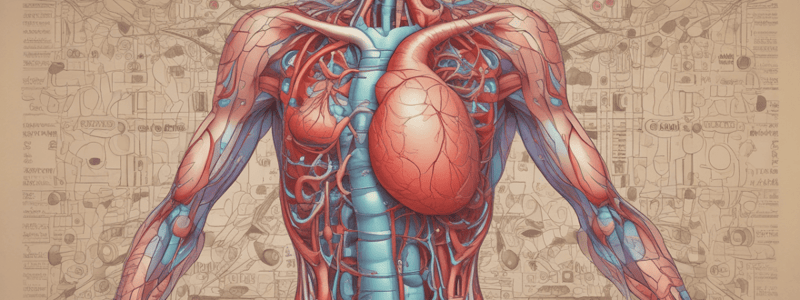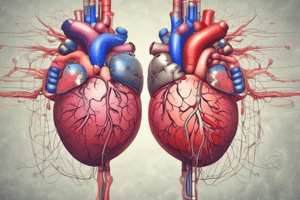Podcast
Questions and Answers
What is the primary function of cardiotonics in the treatment of Congestive Heart Failure (CHF)?
What is the primary function of cardiotonics in the treatment of Congestive Heart Failure (CHF)?
To increase and improve the contraction of the heart muscle
What is the primary goal of antiarrhythmic drugs in treating cardiac arrhythmias?
What is the primary goal of antiarrhythmic drugs in treating cardiac arrhythmias?
To restore normal cardiac function and prevent arrhythmias
What is the underlying mechanism of Atherosclerosis, a disorder of blood vessels?
What is the underlying mechanism of Atherosclerosis, a disorder of blood vessels?
Deposits of fatty plaques on the inner wall of arteries
What is the primary indication for the use of peripheral vasodilating drugs?
What is the primary indication for the use of peripheral vasodilating drugs?
What is the most common adverse reaction associated with cardiotonics?
What is the most common adverse reaction associated with cardiotonics?
What is the key benefit of using antiarrhythmic drugs in the treatment of cardiac arrhythmias?
What is the key benefit of using antiarrhythmic drugs in the treatment of cardiac arrhythmias?
What is the primary consequence of uncontrolled hypertension?
What is the primary consequence of uncontrolled hypertension?
How do cardiotonics improve cardiac function in patients with Congestive Heart Failure (CHF)?
How do cardiotonics improve cardiac function in patients with Congestive Heart Failure (CHF)?
What is the primary mechanism of action of anti-hypertensive drugs?
What is the primary mechanism of action of anti-hypertensive drugs?
What is the common indication for the use of cardiotonics and antiarrhythmic drugs?
What is the common indication for the use of cardiotonics and antiarrhythmic drugs?
Study Notes
Cardiovascular System
- The cardiovascular system consists of the heart, blood vessels, and blood, and its function is to supply oxygen and nutrients to body tissues and remove toxic waste products.
Heart Diseases and Related Drugs
- Congestive Heart Failure (CHF) is a condition where the heart cannot pump enough blood to the body tissues.
- Cardiotonics are drugs used to increase and improve the contraction of the heart muscle, and are used to treat Heart Failure.
- Adverse reactions of Cardiotonics include nausea and vomiting, headache and visual disturbance, and mental depression.
- Cardiac arrhythmia is a disturbed or irregular heart rate or rhythm.
- Antiarrhythmic drugs are used to treat cardiac arrhythmias and restore normal cardiac function, and are also used to treat Myocardial Infarction.
- Adverse reactions of Antiarrhythmic drugs include weakness, hypotension, and drowsiness.
Disorders of Blood Vessels and Related Drugs
- Atherosclerosis is a disorder characterized by deposits of fatty plaques on the inner wall of arteries.
- Peripheral vasodilators are drugs used to dilate blood vessels and treat Atherosclerosis, and their adverse reactions include hypotension, nausea, vomiting, headache, dizziness, and increased pulse rate.
- Hypertension is a serious condition where blood pressure is above 140/90 mmHg, and can cause the heart to work too hard, increasing the risk of heart disease, congestive heart failure, kidney disease, blindness, and stroke.
- Antihypertensive drugs are used to reduce blood pressure, and can work by dilating or increasing the size of arteries, increasing sodium excretion from the body, or inhibiting the action of angiotensin-converting enzyme.
- Examples of Antihypertensive drugs include Vasodilating drugs, Calcium Channel Blockers, Diuretics, and ACE inhibitors.
Studying That Suits You
Use AI to generate personalized quizzes and flashcards to suit your learning preferences.
Related Documents
Description
This quiz covers the mechanism of action, uses, and adverse reactions of peripheral vasodilators, as well as their role in treating hypertension and atherosclerosis. Learn about the effects of these drugs on blood vessels and blood pressure.



